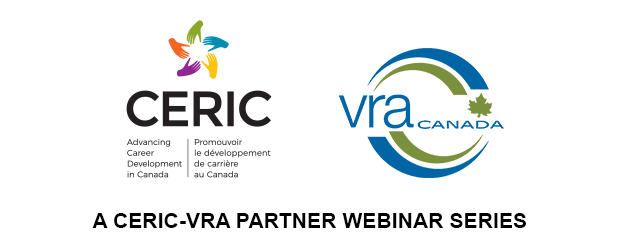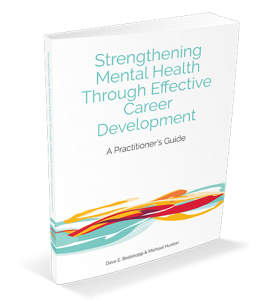
Overview
Career intervention is mental health intervention, yet most career development practitioners and organizations do not explicitly target, improve, measure or report mental health improvements achieved by their services. This oversight of an issue that is so prominently in the minds of the public, policymakers and funders is at our field’s peril, especially in a post-COVID-19 world. Front-line career development practitioners and their managers/employers need to dive deeper in their understanding of how career development services contribute to mental health so that they can improve and communicate these outcomes whether working remotely or face-to-face.
Who Should Attend
The series comes in response to a popular webinar delivered earlier this year by our experts Dave & Michael and will deepen the impacts and strategies career practitioners can implement right away to help their clients strengthen mental health. The series will dig into definitions, a career development effects framework, a stress intervention model, measurements as well as actionable strategies. In particular, the series addresses specific skills that most practitioners possess and how to use them effectively in service of client mental health. This webinar series will help practitioners and their managers recognize, improve, evaluate and communicate the mental health impact of their work, all within ethical, professional and role boundaries.
NOTE: The instructional component of each webinar will be one hour. For participants who can stay longer, a Q&A session will extend for an additional 15 minutes beyond the hour. Of course, if you miss it, the full recording will be available to registered participants.
Webinar #1: Influence and enhance your client mental health through career development practice
Career development practice influences mental health directly and indirectly regardless of practitioners’ intentions regarding mental health. This session will reveal how career interventions, including career counselling, career education, guidance services and work search supports, contribute to mental health. Specifically, this webinar will address:
-
- Understand the differences and connections between mental health and mental illness
- Learn from research showing the interactions between career development, work, mental health and mental illness
- Apply the Career Development Effect Model and understand the main sets of outcomes produced by career development interventions
- Recognize new ways in which practitioners can immediately begin improving the mental health impact of their work
Webinar #2: Develop the competencies to recognize the impact of your career interventions on client stress and coping
Different career development interventions contribute to mental health in distinct ways. Common to all career development intervention, however, is its role in helping clients manage stress. This webinar will:
-
- Show the relationship between stress and mental health
- Describe the three main ways that practitioners can help clients manage stress
- Show how practitioners can do so within their ethical, professional and role boundaries.
- Emphasize the most important of these three stress control areas in career development work – the development of coping competence – likely the most overlooked intervention strategy in the mental health movement
Webinar #3: Building on the skills you have to enhance client mental health outcomes
This webinar will show you how to intentionally use your interpersonal skills to achieve both career development and mental health outcomes for your clients. This webinar will cover:
-
- The key interpersonal skills needed for effective intervention
- The most overlooked yet powerful skills in career development intervention
- How to use these skills to incorporate mental health outcomes in career development practice while also improving career development outcomes
- How to work within ethical and professional boundaries while incorporating mental health awareness and outcomes
Webinar #4: Measure and share your impact on mental health with decision-makers who need to know
The many contributions that practitioners make to client mental health have gone largely unnoticed by practitioners, their employers, funders and policymakers. Practitioners and their organizations have not tracked this impact, largely because funders have not required them to. Funders do not know what practitioners know, and this needs to change. This session will review:
- Straightforward and practical ways by which front-line practitioners, their teams and their organizations can immediately begin measuring mental health outcomes
- How to use measurement data to communicate key messages to stakeholders
- Which stakeholders these outcomes should be communicated to and how
- Communication tools and strategies that you can modify for your own purpose
Presenter Dave & Michael shares her insights on why you should attend this webinar series.
And about their Strengthening Mental Health Guide….
What are people saying about Dave & Michael’s webinar?
“Great session today! I found it provided an effective balance of both theory/background and applied/practical strategies. Super useful for my work with university students!
“This was a terrific webinar and really helps frame how we do influence mental health. I am glad to understand the difference between supporting good mental health and treating mental illness. This helps!!”
“This is one of the most promising and encouraging works to come into our field in a very long time. This work demystifies mental health and shows how every practitioner can be a powerful change agent through career development practices.”



